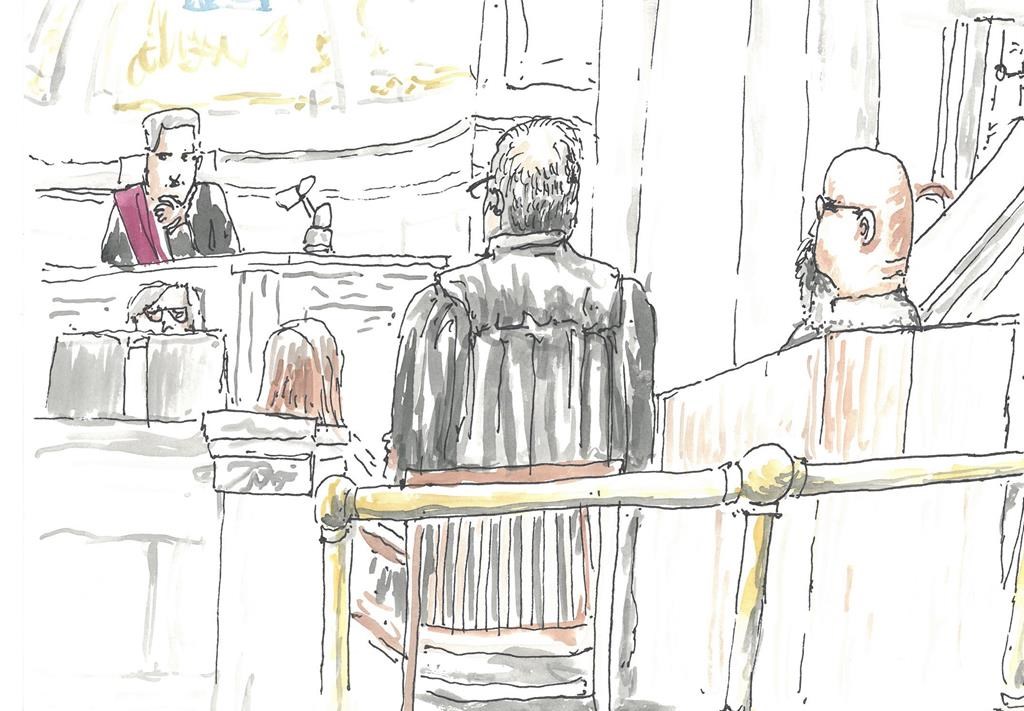They were loving daughters, mothers and friends whose ambition and potential were snuffed out by a “monster.”

Serial killer Jeremy Skibicki was sentenced Wednesday to four concurrent life sentences with no chance of parole for 25 years in the 2022 slayings of four Indigenous women in Winnipeg.
Court of King’s Bench Chief Justice Glenn Joyal told a sentencing hearing he was bound by law to impose the automatic sentence after convicting Skibicki, 37, last month of four counts of first-degree murder.
Relatives and supporters of Morgan Harris, Marcedes Myran, Rebecca Contois and an unidentified woman Indigenous community members have named Mashkode Bizhiki’ikwe, or Buffalo Woman, packed the courtroom as multiple victim impact statements were read.
Some wore sweatshirts bearing the smiling faces of Myran and Contois. A large painted portrait of Myran with a red handprint across her mouth was on display.
Elle Harris told court she can’t condense the loss of her mother into words on a piece of paper.
“Do you know how many times I had to listen to how my mother was murdered, in horrific detail?” the daughter of Morgan Harris asked.
“I am left with my confusion and my anger. I am left without closure. I am left with trauma … I am left feeling numb and hurt. And, finally, I am left without my mother to help me get through it all.”
Skibicki showed no emotion during the roughly 3 1/2-hour hearing. He sat in the prisoner’s box flanked by sheriffs and stared straight ahead without acknowledging the family members who shared statements.
Cambria Harris, Morgan Harris’s eldest daughter, stood with her partner and looked directly at Skibicki as she spoke.
“Every moment (Skibicki) spends in this courtroom breathing, free even in shackles, is another moment my mother is not,” she said.

Get breaking National news
“While (Skibicki) gets to stay there, surrounded and protected, my mother continues to lay in a landfill — the very place (Skibicki) put her.”
Cambria Harris said her mother, who had five children, was robbed of the opportunity to spend time with her youngest child and granddaughter.
Court heard Morgan Harris was also loved by many who called the streets home, as the 39-year-old did at various points in her life.
Cambria Harris said her mother struggled with mental health issues, and Skibicki stole any chance she had of getting the help she deserved.
She ended her statement by swearing at Skibicki in a calm, raised voice, after which the gallery erupted into cheers and applause.

Grand Chief Cathy Merrick of the Assembly of Manitoba Chiefs told court the killings have left deep scars and will be felt for generations.
“The actions of this convicted murderer have underscored the need for justice and accountability,” Merrick said, fighting back tears.
The trial heard Skibicki targeted the women at homeless shelters, then strangled or drowned them before disposing of their remains in garbage bins in the spring of 2022.
The killings came to light when a man looking for scrap metal found the partial remains of 24-year-old Contois in a dumpster in Skibicki’s neighbourhood. More of her remains were discovered at a city-run landfill.
Jeremy Contois read a statement on behalf of his sister Stephanie, as she stood by.
In it, she described the moment police arrived at her home to tell her they had found the body of her sister, leaving her in the most agonizing shock she’s ever felt.
“I can’t look at a garbage bin … it makes me sick to my stomach,” she wrote.
During a police interrogation, Skibicki admitted to killing Rebecca Contois and the three other women.
Skibicki told police the killings were racially motivated and cited white supremacist beliefs.
At trial, a defence lawyer said Skibicki admitted to the killings but was too mentally ill to be held criminally responsible.
The judge said he agreed with a psychiatrist who testified for the Crown that Skibicki didn’t have a mental disorder that affected his ability to know the killings were morally wrong.
During the sentencing hearing, Joyal asked if Skibicki had anything to say.
“Nope,” he replied.
In 2022, police said they believed the remains of Harris and Myran were taken to another landfill outside the city but there would be no search. Police said too much time had passed and it would be too complex and dangerous.
There were countrywide protests demanding a search of the Prairie Green landfill. The federal and Manitoba governments recently committed a combined $40 million for a search, which is expected to start later this year.
Joyal acknowledged the “profound grief” each of the families have had to endure. He thanked them for their bravery and honesty.
The women’s families “deserved more than what can be accomplished in a courtroom,” he added.
Outside the courthouse, Myran’s sister said she appreciated Joyal’s words, but added the sentence will never be enough.
“What (Skibicki) did to those women, he deserves a lot more than what was put on him today,” said Jorden Myran.
Her grandmother, Donna Bartlett, called Skibicki an “evil monster.”
“He has hurt this family, tore it apart, ripped our souls to pieces. That’s going to be there forever.”
The federal government has a support line for those affected by the issue of missing and murdered Indigenous women and girls: 1-844-413-6649. The Hope for Wellness Helpline, with support in Cree, Ojibway and Inuktitut, is also available to all Indigenous people in Canada: 1-855-242-3310.
















Comments